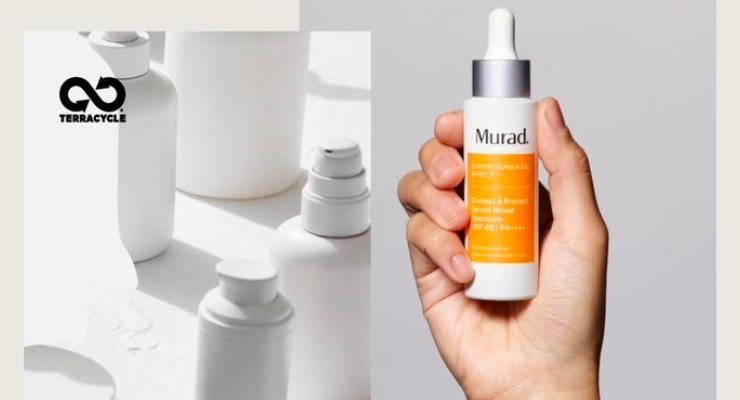04.20.22
In celebration of Earth Month, clinical skincare brand, Murad, is partnering with TerraCycle to divert plastic waste from landfills while turning it into new recycled products.
Through the Murad Recycling Program, the brand is now providing customers with the opportunity to recycle Murad product packaging while earning charitable donations for non-profits in the process.
Once collected, the packaging is cleaned and melted into hard plastic that can be remolded to make new recycled products. Every shipment of packaging sent to TerraCycle also earns collector points that can be used for charitable gifts or converted to cash and donated to a non-profit, school or charitable organization of their choice.
"Today, consumers understand more than ever the importance of sustainability," explains Dr. Murad. "It has been my life's work, and the foundation of Murad, to help people attain healthier skin and happier lives. Through our newly founded partnership with TerraCycle, we further strengthen this pledge by providing easy steps to help our community support the health of our planet. Because wellness for the planet is just as important as wellness for the people."
"Murad is giving their customers the unique opportunity to divert waste from landfills by offering them a way to responsibly dispose of their cosmetic packaging," said TerraCycle CEO and founder, Tom Szaky. "In turn, by participating in the Murad Recycling Program, consumers can demonstrate their respect for the environment not only through the products that they choose to include in their beauty regimen, but also by how the packaging is disposed of."
Any interested individual, school, office, or community organization can participate in the Murad Recycling Program.
This includes Murad's goal of transitioning to a 50% reduction in virgin plastic by 2025, the integration of 50% PCR components by 2030 and to be 100% recyclable by 2030. Achieving these goals will reduce the total amount of virgin plastic going in landfills by 750,000 pounds by 2025 and 1.25 million pounds by 2030.
Through the Murad Recycling Program, the brand is now providing customers with the opportunity to recycle Murad product packaging while earning charitable donations for non-profits in the process.
How It Works
To participate in the Murad Recycling Program, sign up on the Murad program page or the TerraCycle program page, download a pre-paid shipping label and mail in Murad empties.Once collected, the packaging is cleaned and melted into hard plastic that can be remolded to make new recycled products. Every shipment of packaging sent to TerraCycle also earns collector points that can be used for charitable gifts or converted to cash and donated to a non-profit, school or charitable organization of their choice.
"Today, consumers understand more than ever the importance of sustainability," explains Dr. Murad. "It has been my life's work, and the foundation of Murad, to help people attain healthier skin and happier lives. Through our newly founded partnership with TerraCycle, we further strengthen this pledge by providing easy steps to help our community support the health of our planet. Because wellness for the planet is just as important as wellness for the people."
"Murad is giving their customers the unique opportunity to divert waste from landfills by offering them a way to responsibly dispose of their cosmetic packaging," said TerraCycle CEO and founder, Tom Szaky. "In turn, by participating in the Murad Recycling Program, consumers can demonstrate their respect for the environment not only through the products that they choose to include in their beauty regimen, but also by how the packaging is disposed of."
Any interested individual, school, office, or community organization can participate in the Murad Recycling Program.
Other Sustainability Initiatives
The Murad Recycling Program is just the newest addition to the brand's repertoire of sustainability initiatives.This includes Murad's goal of transitioning to a 50% reduction in virgin plastic by 2025, the integration of 50% PCR components by 2030 and to be 100% recyclable by 2030. Achieving these goals will reduce the total amount of virgin plastic going in landfills by 750,000 pounds by 2025 and 1.25 million pounds by 2030.




























